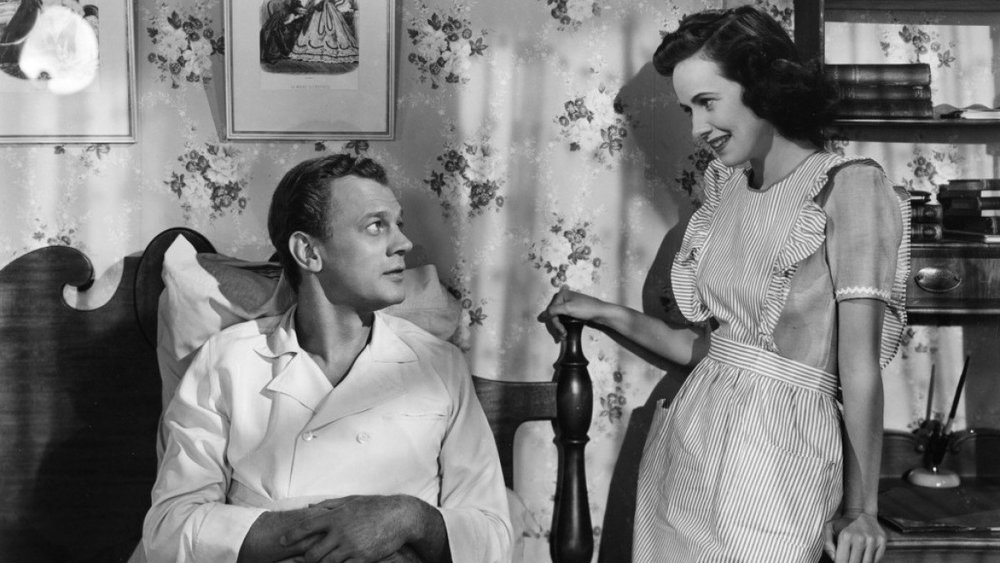Catch up on the series and find new installments daily here.
__________________________________
Shadow of a Doubt (1943)
__________________________________
TYPE OF FILM: Suspense
STUDIO: Universal
PRODUCER: Jack H. Skirball
DIRECTOR: Alfred Hitchcock
SCREENWRITERS: Thornton Wilder, Alma Reville and Sally Benson
SOURCE: Original Story by Gordon McDonnell
RUNNING TIME: 108 minutes
PRINCIPAL PLAYERS:
Teresa Wright……………………………………………………….……………..Charlie Newton
Joseph Cotten……………………………………………………………..…Uncle Charlie Oakley
Macdonald Carey………………………………………………………………….….Jack Graham
Patricia Collinge…………………………………………………………..………..Emma Newton
Henry Travers………………………………………………………………….………Joe Newton
Wallace Ford…………………………………………………………………………Fred Saunders
Edna May Wonacott………………………………………..…………………………Ann Newton
Hume Cronyn………………………………………………………………………..Herb Hawkins
Charles Bates………………………………………………………………………..Roger Newton
__________________________________
DID YOU KNOW?
__________________________________
Shadow of a Doubt was based on a true story. In 1938, a man who lived in New York went to a small California town named Hanford ostensibly to visit his sister and her family, but he was actually trying to go into hiding. His efforts failed when the law caught up with him, and he was arrested for the murder of several rich women on the East Coast. Gordon McDonnell, a playwright, read newspaper accounts of the incident and went to Hanford with the idea of writing a play. He was married to Margaret McDonnell, the head of Selznick Studio’s story department, who told Hitchcock that her husband had a wonderful story idea that he hadn’t yet written. Hitchcock and the couple had lunch together while McDonnell told the story, and Hitchcock told him to go home and write it. He did, producing a nine-page treatment that the director gave to Thornton Wilder to turn into a screenplay.
__________________________________
THE STORY
__________________________________

Charles Oakley travels from New York to Santa Rosa, California, to visit his sister and her family. Unbeknownst to his family, he is suspected of murdering three widows in the East and has come across the country to hide from the police. Especially thrilled to meet him is Charlie, the lovely niece who was named for him and with whom he seems to have a telepathic connection.
Charlie becomes utterly infatuated with her handsome uncle, who gives her an emerald ring inscribed with the initials M.B. When she begins to hum “The Merry Widow Waltz,” it obviously upsets him.
Jack Graham, a detective claiming to be a poll taker, and his partner, masquerading as a photographer, come to the house, ostensibly to interview the family but really to take a picture of Oakley. Jack takes Charlie on a date and she guesses his real identity. Although outraged, she agrees not to tell her uncle. As soon as they separate, she rushes to the library to find the newspaper and spots an article her uncle had removed earlier that day, a story about “The Merry Widow Murderer,” one of whose victims had the initials M.B. Charlie becomes even more convinced that her uncle is the killer when he talks with open hatred and contempt for widows, likening them to swine.
When Oakley forces Charlie into a bar to discuss her evidently changed attitude, he tells her she knows nothing of the world but, realizing that she knows the truth about him, he agrees to leave town. When another suspect is killed in the East, he assumes he is now safe and decides to stay in Santa Rosa. Still concerned that his niece knows too much, however, he attempts to kill her by trapping her in a garage as a car motor runs.
Charlie pointedly wears the emerald ring to a party, convincing Oakley to leave town. The family sees him off, and he traps Charlie on the train as it takes off and tries to push her out as it speeds along the tracks but, in the struggle, he trips and falls in front of an oncoming train. As the town gives him a grand funeral, Charlie and Jack agree to keep secret the truth about her psychotic uncle.
***
There is a strong autobiographical element in Shadow of a Doubt, probably more than in any other of Hitchcock’s films. The mother of the family is named Emma, just as Hitchcock’s mother was. Uncle Charlie is described as “neat and fussy,” as the director often was, and an accident Oakley has on a bicycle is precisely the same as one Hitchcock incurred in childhood. Before the accident, Uncle Charlie is described as “such a quiet boy, always reading,” as was true of Hitchcock, who also shared the villain’s nostalgic view that the world was once a better place. Hitchcock also identified with Herbie Hawkins, who lives with a sickly and demanding mother and who is devoted to crime stories, obsessively talking about ways of murdering people.
Hitchcock wanted to film on location in Santa Rosa but was initially thwarted when the town refused. Less than two decades earlier, it had been swindled out of $25,000 when a production company said it wanted to build a studio but instead sold worthless bonds and disappeared. The secretary of the Chamber of Commerce, however, managed to convince the residents that Universal was a legitimate company, and permission was granted.
Hume Cronyn made his screen debut as Herbie Hawkins.
Shadow of a Doubt was remade in 1958 as Step Down to Terror, a listless production that was only a whisper better than the 1991 television movie using the original title.
__________________________________
BEST LINE
__________________________________
At the funeral for Oakley, his niece tells detective Jack Graham that her uncle saw the world as a terrible place. “It’s not quite as bad as that,” he tells her. “Sometimes it needs a lot of watching. Things go crazy every now and then. Like your Uncle Charlie.”


















